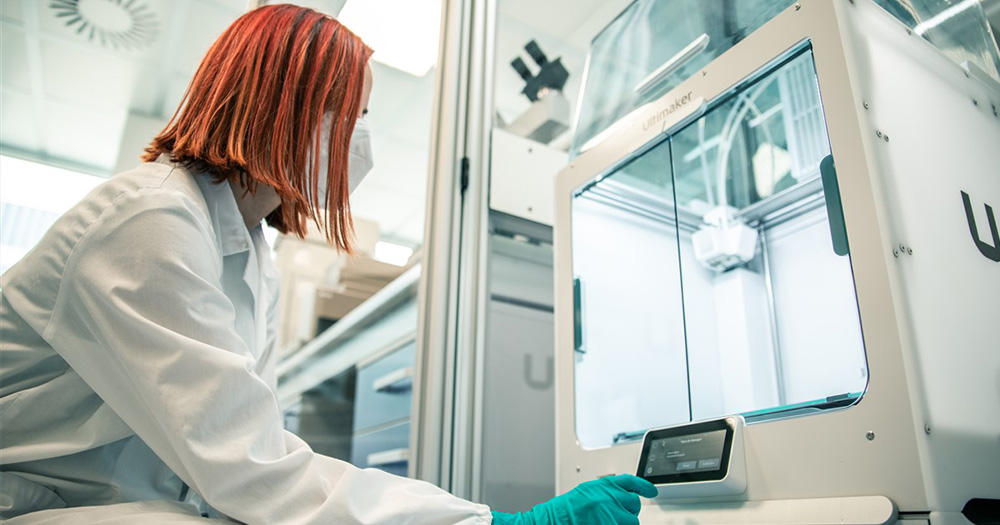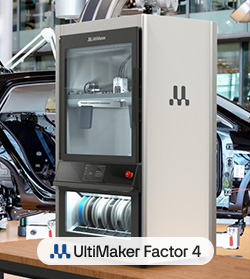Angelini Pharma: from research to production of personalized drugs thanks to 3D printing

An interview with Elisa Ficiarà and Marilena Saviano, Preformulation Scientists at Angelini Pharma.
---
Angelini Pharma is the pharmaceutical division of Angelini Group. The Group started almost 100 years ago and today is a leader in healthcare, with particular strength and expertise in the fields of Central Nervous System and Mental Health, including Pain, and Rare Diseases.
With an extensive R&D operation, Angelini Pharma aspires to become a leading European player in innovation, offering people, patients and their beloved ones new medicines and solutions to achieve better health outcomes and higher quality of life.

The research embraces public-private partnerships with recognised academic institutions and centres of global importance. The network created thanks to MarcheBioBank Project (co-financed by the European Regional Development Fund) led to a collaborative research platform for personalized medicine: drugs, diagnostics and new therapeutic approaches.
This project allowed us to introduce in our research field the Fused Filament Fabrication additive manufacturing technology for the development and testing of new effective and concrete solutions, in a world constantly changing in complexity and instances. Our reseach activities are strategic for “4P medicine”: Personalized, Predictive, Preventive and Participatory.




We are challenging the status quo introducing the development via innovative technologies of new therapeutic tools for the personalised treatment of patients with specific needs and with rare diseases, raising the possibility of success of therapeutic plans, and thus safety of treatments and patient’s adherence.
In fact, in the context of individual healthcare, 3D printing is a functional tool with countless benefits: accurate dosing of drugs, flexibility in dose adjustments, tailored release profiles, combination of multiple active principles in one dosage form, personalization of the delivery system in shape, geometry, excipients, needs, and rapid on-demand decentralized production.
Ultimaker platforms offer reliability, extreme accuracy in deposition, the highest resolution of printing, air filtration, and filament humidity control. Moreover, we can produce in-house drug-laden filaments and use them as feedstock materials for Ultimaker printer, thanks to the versatile machine configuration and the easy re-tune of printing parameters through the Ultimaker Cura software. All these characteristics are extremely necessary for the production of high-quality pharmaceuticals with the required reproducibility.


We are exploiting the unlimited flexibility of Ultimaker printers with the aim of investigating and developing different classes of oral delivery systems, i.e. oral vehicles with the adequate release kinetics, chewable formulations and orodispersible prints.
With a single printer we can easily create boundless freeform geometries and different formulation types, without the need of re-tooling our equipment for the production; moreover, the possibility of rapid prototyping of innovative products offers us a pragmatic tool for a fast screening of potential industrial products.
In fact, the applications of 3D printing in the pharmaceutical branch are countless, starting from the rapid prototyping of formulations, passing through the potentiality in phase I clinical trials, arriving to end use products.


However, there are a number of regulatory and technical challenges that have to be addressed prior to the integration of 3D printing techniques into drug development and clinical practices, as equipment with qualified building materials, software, cleaning procedures and production workflows. Nevertheless, far-sighted cooperation of additive companies, like Ultimaker, and pharmaceutical industries are speeding up the depiction of a framework that supports the applicability of Additive Manufacturing in different domains.
In this context, our prospective is to be pioneers of the future paradigm shift in medicine design, manufacture and use by investigating these novel techniques and discovering their potentialities in industrial applications.
Our research projects and achievements may help raise the awareness and acknowledgment about the 3D printing capabilities in the field of pharmaceutical sciences and healthcare. Indeed, additive manufacturing is disruptively re-shaping the world in a wide array of production, and may also play a complementary or alternative role to manufacture of conventional medicines and revolutionary industrial products with unique characteristics.
In Same Category
Related by Tags
- Krones: Optimized 3D-printed parts & spares for customers anywhere
- 3D printing for the production of sheet metal bending dies
- Bambu Lab X1E: multifilament 3D printing in industrial applications
- 3D printing for the Education and STEM disciplines: the FabLab Poliba experience
- 3D printing and footwear: the FuSa shoe







Leave your comment